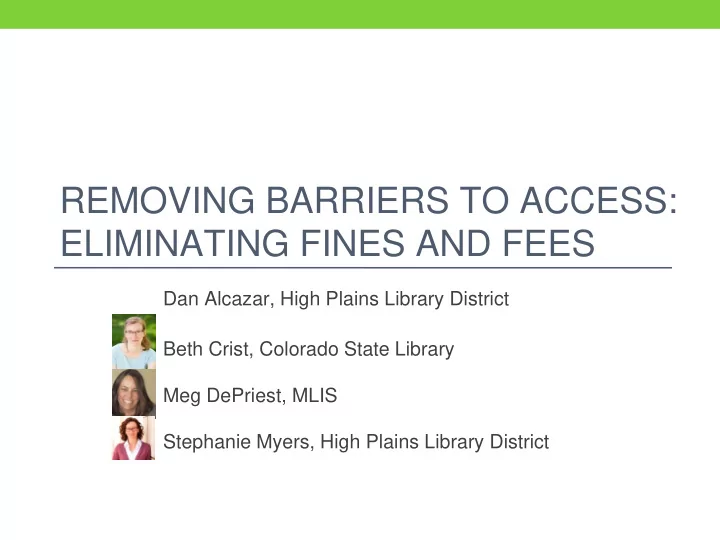

REMOVING BARRIERS TO ACCESS: ELIMINATING FINES AND FEES Dan Alcazar, High Plains Library District Beth Crist, Colorado State Library Meg DePriest, MLIS Stephanie Myers, High Plains Library District
All about YOU!
https://goo.gl/rbwStj
Does your library charge overdue fines? Small Midsize Large Total (weighted) <25K 25K-99K 100K+ 92% 88% 95% 96% Have you considered eliminating fines? Small Midsize Large Total (weighted) <25K 25K-99K 100K+ 34.3% 25.9% 31.6% 53.5% Dixon, J. & Gillis, S. (2017). Doing fine(s)? Fines & Fees. Library Journal.
Total fines collected monthly Small Midsize Large Total (weighted) <25K 25K-99K 100K+ $3,345 $449 $2,691 $9,788 Monthly costs to collect fines Small Midsize Large Total (weighted) <25K 25K-99K 100K+ $714 $84 $594 $3,265 Dixon, J. & Gillis, S. (2017). Doing fine(s)? Fines & Fees. Library Journal.
Other costs linked to collecting fines ● Stressful for staff ● “Libraries have enough combat” ● “Not worth the severed relationships” ● Impacts those who can least afford it ● Contributes to negative stereotype
Why do we charge fines? ● Teaches civic responsibility ● Ensures equal access
Do the data support our assumptions?
Late fees did not influence borrowing behavior. No significant difference in overdue rates between libraries that charged fees and those that did not Hansel, P. and Burgin, R. (1983). Hard facts about overdues. Library Journal, 180 (4), 349.
Low fines did not reduce overdue rates. Small fines did not result in more prompt return of material. Large fines did. Burgin, R. & Hansel, P. (1984). More hard facts about overdues. Library & Archival Security, 6 (2-3), 5-17 .
Rewards did not affect overdue and loss rates. Incentives (gift cards, etc.) did not change the speed of return of items. Eliminating late fees did not affect circulation rates. Smith, F. & Mitchell, W. (2005). Using rewards to minimize overdue book rates. Journal of Access Services, 3 (1), 47-52. Reed, K., Blackburn, J. & Sifton, D. (2014). Putting a sacred cow out to pasture: Assessing the removal of fines and reduction of barriers at a small academic library. Journal of Academic Librarianship, 40 (¾), 275-280.
“Fines are a contentious topic among librarians, with many strongly held beliefs about their effectiveness backed by little evidence.” Reed, K., Blackburn, J. & Sifton, D. (2014). Putting a sacred cow out to pasture: Assessing the removal of fines and reduction of barriers at a small academic library. Journal of Academic Librarianship, 40 (¾), 275-280.
What do borrowers think about fines and fees? • Libraries are unfriendly places with strict rules • Low-income users avoid using library to avoid fines and fees • Parents say fines and fees are a barrier to the library Breslin, F. & McMenemy, D. (2006). The decline in book borrowing from Britain’s public libraries: A small scale Scottish study. Library Review, 55 (7), 414-428. Zhang, D. (2013). SPELL research methodology and findings.
Questions?
Putting the Research into Action Stephanie Myer, Patron Services Supervisor
I owe how much???!!!
WHERE DID THE IDEA COME FROM? ● Book Desert ● SPELL Project ● Staff Recommendation
Why eliminate late fees? ● Dollars are negligible ● Fines feel like punishment ● Remove barriers ● Provide equitable access ● Promote literacy
LOGISTICS ● Eliminated most fines ● Reminder notice sent 3 days prior ● Overdue notice sent at 3 days & 10 days ● Invoice sent at 45 days ● Card blocked after $7.50 ● Unique Management used for unresolved charges
Effects of Reducing fines Financial savings: • Cancelled 3M payment plan @$8,000 per year and rising • Transferred from Comprise to III @$13,000/year Loss of revenue: • Staff time savings @30 seconds • ↓ in fine revenue per transaction • ↑ in Unique • ↓ in number of money handling Management fees transactions Money is neutral
We still collect for: ● Blu-rays and DVDs ($.10/day) ● Lost items ● Damaged items
Due Date Analysis • Items not returned – 1 week overdue = 7.66% • 45 Days – Item is billed • 61 days – Item goes to Debt Collection
80-90% Patrons are (mostly) happy 10% A tad skeptical
Increase in Children’s Materials Circulation ● +4% media ● +8% juvenile ● +16% picture books
FOOD FOR FINES For every can donated, we remove $1 of fines.
ELIMINATING FINES IS A WIN-WIN For Patrons: For the Library: ● Good will ● Responsive to community ● Trust needs ● Fewer uncomfortable ● Accountability conversations ● More participation in library ● Continued rate of return programs & services ● Less cost to administer ● More use of collection
Questions?
A growing trend…
Thank You! Eliminating Fines and Fees White Paper: https://goo.gl/rbwStj Dan Alcazar, dalcazar@highplains.us Beth Crist, crist_b@cde.state.co.us Meg DePriest, megdep@gmail.com Stephanie Myers, SMyers@highplains.us
Recommend
More recommend